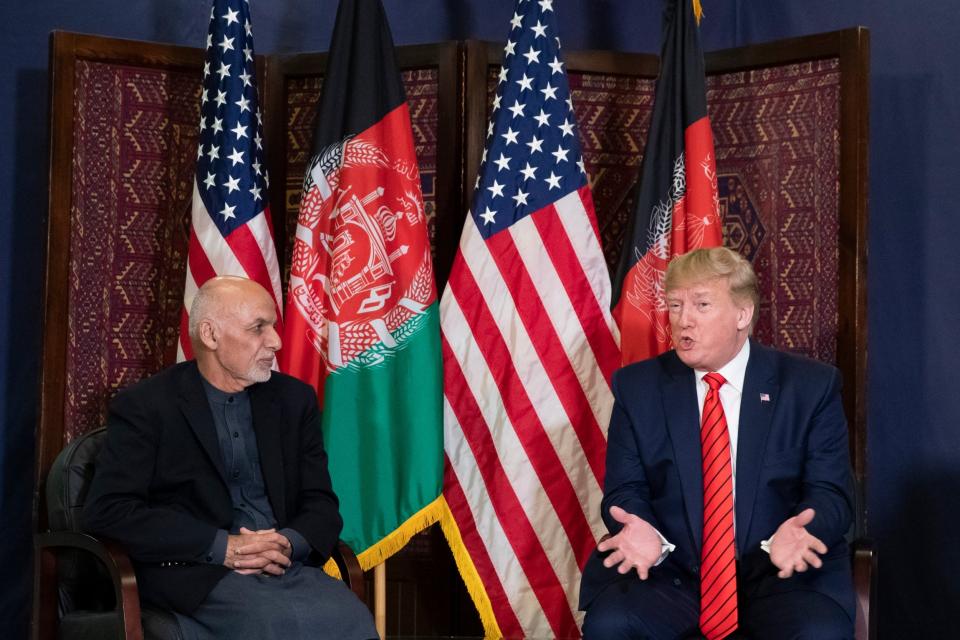Donald Trump cannot claim peace with Afghanistan until the Taliban is dealt with

President Donald Trump’s well-known disdain for the arcana of policy has one advantage. On topics where neither he nor his authoritarian buddies or Washington ideologues who colour his Middle East policies have much of an interest, there is space for real change.
Last week came news of an apparent breakthrough in talks with the Taliban over a possible peace agreement for Afghanistan.
In a rare moment, even jaded members of Afghanistan’s political class are sounding hopeful.
"Our optimism concerning the protracted and controversial peace process these days is growing,” former Afghan lawmaker Gul Pacha Majidi, who narrowly escaped a suicide bombing in 2015, said during a television interview. “After the lengthy negotiations, both the US and the Taliban will get closer to a peace deal.”
US officials say they’re eager to cut some kind of deal with the Taliban as soon as possible. As with everything in Trump-world, there’s a domestic political calculation. Peace in Afghanistan would hand Trump a trophy that has eluded his two predecessors, and just ahead of the November elections.
But that appears to be where the political considerations end. The emerging details of the plan, more than a year in the works, suggest it has been hammered out in the Qatari capital of Doha by professional policy hands.
US envoy Zalmay Khalilzad, an American of Afghan origin who served as US ambassador to the country after the 2001 US invasion, likely sees bringing peace to his birth country as the fulfilment of a lifelong quest.
Trump may consider such foreign entanglements expensive and politically unpopular. But if his selfishness and myopia bring a measure of peace to a wounded country that has known little but war for more than four decades, then so be it.
There are a number of reasons for cautious optimism. First off, the Kabul government is being kept in the loop, not getting surprises sprung on it that would raise fears the US-led forces in Afghanistan were about to abandon another ally. Nato’s senior civilian envoy to Afghanistan, Sir Nicolas Key, has asked Afghan officials to come up with an “inclusive” panel of delegates who could meet directly with the Taliban.
Officials have said the peace mechanism would start with a seven-day period of reduced violence from 14 February, ending with signing a peace deal on 21 February, and the beginning of intra-Afghan negotiations.
"The best, if not only, solution forward is a political agreement,” US defence secretary Mark Esper said in Brussels last week. “We have the basis for one on the table, and we are taking a hard look at it. We are consulting with our allies. We are consulting with Congress and others. And I think peace deserves a chance.”
A political deal and the reduction in violence would lead to fewer international troops being demanded by the Taliban. But each step of the way would be contingent on whether the Taliban refrains from attacks on Afghan or US troops.
“Military decisions are going to be taken on the basis of where we are, and I think everybody is restrained in their expectations,” a senior State Department official told reporters on Saturday from the sidelines of the Munich Security Conference. “We bring the violence down – this hope – and see what comes next.”
Ideally, this “conditions-based approach,” as Esper calls it, could box the Taliban in and encourage them to avoid giving in to their extremist tendencies.
The Taliban still may have not changed their ways. They are an extremist organisation that could wipe away gains for minorities and women that have come about over the last 18 years in Afghanistan. According to Jane’s Terrorism and Insurgency Centre, they were responsible for a 60 per cent spike in fatal attacks throughout Afghanistan last year.
"No one is going towards a ceasefire and peace blindly,” Afghan Defence Minister Asadullah Khalid was quoted as saying by local media.
Despite their extremist tendencies, the Taliban have an incentive to seek peace. The violence is taking a terrible toll on Afghan civilians. But it is also hurting the Taliban. Last week Taliban leader Maulawi Sardar Mohammad and eight fighters were killed in an airstrike in Balkh province while another commander, Mullah Abdul Rahim Tofan, and five others were killed in a separate airstrike in Herat province.
Many of the attacks on the Taliban are coming from the Afghan government’s flawed but now formidable armed forces under the command of President Ashraf Ghani. “It would be foolish to discount the raw bargaining power that the sheer size of the Afghan National Army gives Ghani and the Afghan government,” Candace Rondeaux, an Afghanistan expert, wrote last week.
In addition to the Taliban, one of the biggest stumbling blocks to achieving peace are the divisions on the government side. The national unity government has failed to come up with a delegation to meet the Taliban and appears unprepared for the possibility of a ceasefire.
Even if a deal with the Taliban holds, breakaway factions or the Isis Afghanistan branch could sabotage it with more violence.
Still, the drive towards peace continues. The Taliban are not going away. They are not going to be defeated. They are a part and parcel of Afghan society and politics, and if Afghanistan is to have any future they must be dealt with. The alternative is yet another decade or more of war.
Read more
Afghan president set for second term after narrow election victory
US officials distorted statistics to mislead public about Afghan war

